Yiorgos Boudouris, community leader-communicator-Acts of Greatness founder
“Sometimes leadership is just showing up and being yourself; if you’re being yourself in an environment that doesn’t support who you are, that’s an act of greatness.”
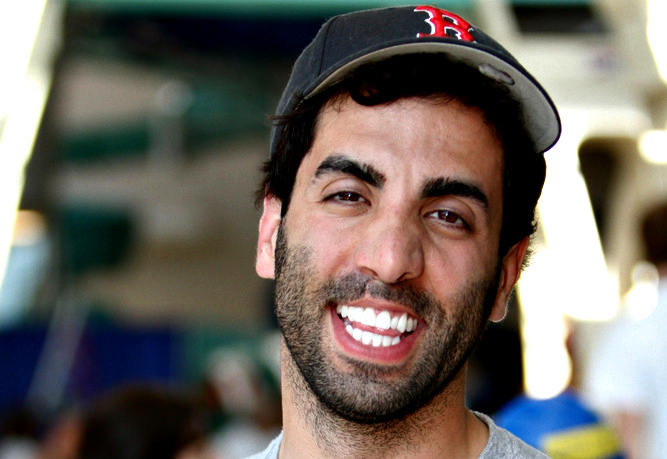
Of the many wonderful things to admire about Yiorgos Boudouris, three stand out to me: his seemingly innate confidence and positivity; his propensity for gratitude; and his desire to give back to those who haven’t shared his good fortune.
Yiorgos is the founder and, to date, the sole funder of Acts of Greatness, a nonprofit committed to supporting the development of LGBTQ-specific awards for Calgary, Alberta-based secondary school students planning to pursue post-secondary education. (That acronym, in case you don’t know, stands for lesbian, gay, bisexual, transgender, queer/questioning.) He launched the organization earlier this year after reading an article in The Calgary Journal, Mount Royal University’s student newspaper, about the dearth of LGBTQ community awards—in Alberta in particular and throughout Canada as a whole.
A gay man himself, Yiorgos is attached to the LGBTQ community and well aware that his peers are at greater risk than their heterosexual peers of being bullied, suffering depression, attempting suicide or becoming homeless, among other dangers. Determined to do something about it, he reached out to EducationMatters, “Calgary’s trust for public education,” and offered to fund a one-time award for local LGBTQ high school students going on to post-secondary school in September 2014.
But to a generous and passionate soul like Yiorgos, that wasn’t enough.
“It seemed like a very passive way to contribute, just for one year,” he says. “I didn’t feel a sense of involvement quite like I wanted.” So Yiorgos he started researching how he could launch an organization that would support LGBTQ students in the long term. And with that, Acts of Greatness was born.
Clearly, Yiorgos cares about supporting those in need. Or, in the words of his partner, Jeff, who nominated him for this website, “Yiorgos is someone who gives a damn. He is both inspired and inspiring. His willingness to help others, as well as look for ways to meaningfully contribute to our community, deserves to be recognized.”
In recognition of greatness
Yiorgos is a proud first-generation Canadian. His father, Nick Boudouris, is Greek-Canadian and his mother, Marina Boudouris, is British-Canadian. Yiorgos grew up in Midland, Ontario, which he describes as “kind of cottage country-ish, beautiful, bound by the bay, just a gorgeous little town.” But he was born about 150km south of Midland, in Toronto’s SickKids Hospital, because of a cleft lip and palate that required medical attention.
He spent the first few weeks of his life getting special care through the Cleft Lip and Palate Program, and received ongoing surgeries throughout his youth and into his teen years. In spite of growing up with those medical challenges and the feeling that “there’s something to be fixed,” he emerged from the experience fully intact, with no emotional scarring. He even points out the positives that came from the situation.
“I was really well taken care of by my sisters,” Yiorgos says of his two elder siblings, Smaragda and Eleni. “When a child is sick, everyone rallies around and that was really awesome. I don’t remember having fights with my sisters or any of that kind of stuff because they really had my back right from the start.”
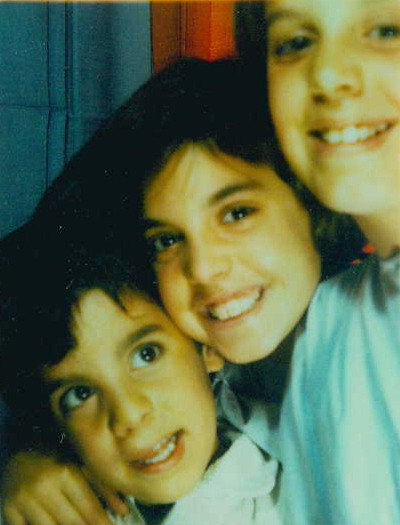
From left: Yiorgos, Eleni and Smaragda
It probably also helped that their parents made sure their children were active and engaged with life. Case in point, all three Boudouris kids had great success with swimming. Yiorgos started competing at age eight, training with the likes of future Olympians Jennifer Fratesi and Keith Beavers—“people to be proud of.”
Whatever the reasons, Yiorgos came away from his years at SickKids virtually unscathed. He says his cleft lip and palate never come up in daily life anymore “because the doctors were so amazing.” But even if they did, it wouldn’t get to him. “I’d think, ‘Really, that’s what you’re going to make fun of?’” he says with a laugh. “That’s not very original at this point.”
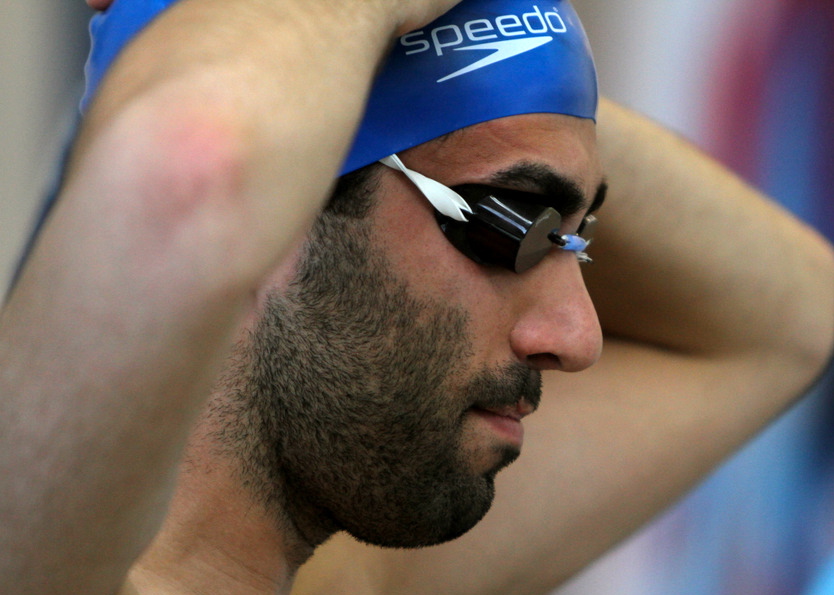
Yiorgos at a swim meet, Calgary, Alta., 2012
A gay outlook
Yiorgos’ confidence and strong sense of self made it relatively easy for him to accept that he’s gay. He calls it “a pretty boring realization” in that there was no dramatic reveal; when he was around 12 years old, he says, “you’re thinking about who you want to be with and at that time I remembered thinking I would rather spend a life or have that kind of companionship with a man. And I just thought, ‘Okay, so this is what you want. Interesting.’”
He didn’t feel the need to talk about being gay because he was okay with it. Even when he attended St. Theresa’s Catholic High School, he didn’t run into any problems. “I never felt like there was this institution that was against me or anything like that. But you also weren’t really demonstrating your homosexuality either, so it’s not like I had a boyfriend in high school, and I wasn’t going to prom with a man as my date.”
Although he felt fine with who he was, he didn’t get to experience the same ease of falling into place that many of his heterosexual peers took for granted—people who fit the norm and didn’t need to look elsewhere for examples or inspiration. “At the time, there were maybe only one or two other kids we thought were gay in high school,” says Yiorgos. “Maybe there was this silent bond between us, like ‘I think you think what I think,’ but there was no one to kind of necessarily look up to or have as a mentor or talk through those issues. And it’s not that there were issues but it’s kind of, ‘How do I figure this one out? Because I don’t know what’s out there for me.’”
As the first gay person in his family, he didn’t have relatives to look to, either. It wasn’t until graduating high school in 2002 that he started being able to express his sexuality and put it into words. When he did, his family was accepting, something he very much appreciates. “There are still some people who go through that turmoil of coming out and maybe losing a family environment like a home, losing financial support, all of those things. That wasn’t my reality and I’m grateful for it.”

Young Yiorgos with his loving parents
Still, he never looked to others for approval of his orientation. “I was just very strong-minded about it. I didn’t see it as a problem and it wasn’t something that scared me. I didn’t really have time for people for whom it was an issue. I wasn’t in the business of convincing people that I was okay… I’m thankful I had that attitude, that there wasn’t this great pain that it made me feel. But it did take me a long time to figure out, ‘What are my options as a gay person? Do I have to look a certain way or do I have to behave a certain way or do I have to hang out with certain kinds of people?’ That really took a long time to figure out, to understand how I want to define myself.”
As homosexuality is becoming more normalized within his community, he sees that today’s youth have more support and role models to turn to. But at the same time, he says, “the global community is worse now than it was back in my day. There are more laws criminalizing homosexuality than when I was a teenager coming out, and that’s just shocking to me. If you’re a teenager now, you’re much more connected to the global community, not necessarily just to your high school community or the community immediately around you, so I can’t imagine what goes through their minds at some of the stuff they have to read and hear.”
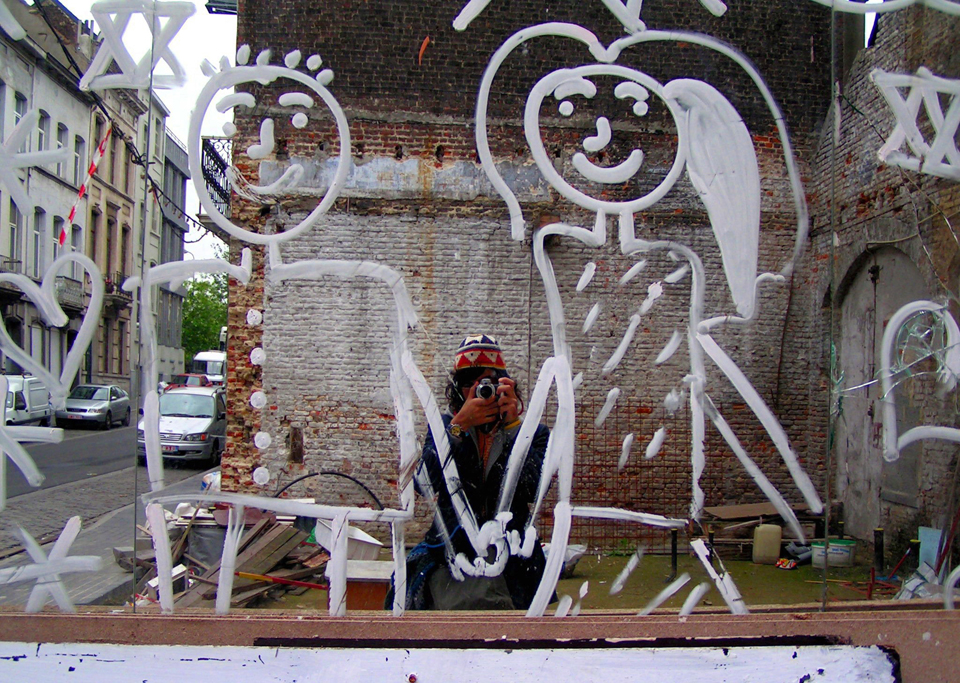
Belgium, taken by Yiorgos while studying abroad, 2006
Opening minds
Yiorgos has had the opportunity to explore a variety of communities, thanks to an exchange he took to Glasgow Caledonian University during the third year of his communications degree at Brock University. In Scotland, the flights were cheap, the course load was light, and young Yiorgos took every chance he got to explore the world from his temporary home base.
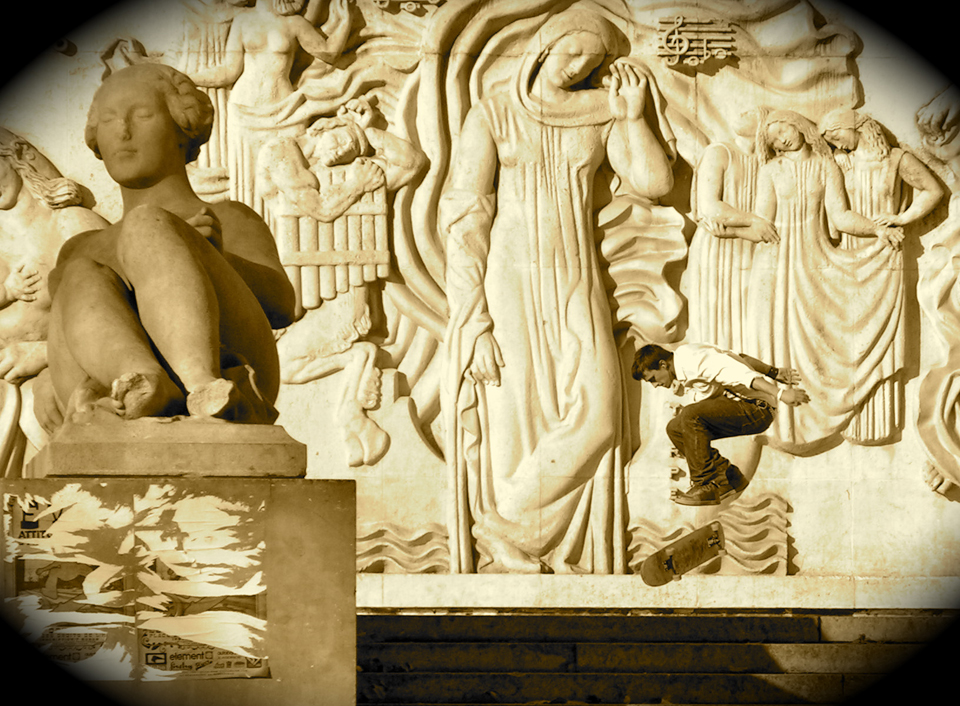
Paris, France, taken on one of Yiorgos’ jaunts from Scotland, 2005
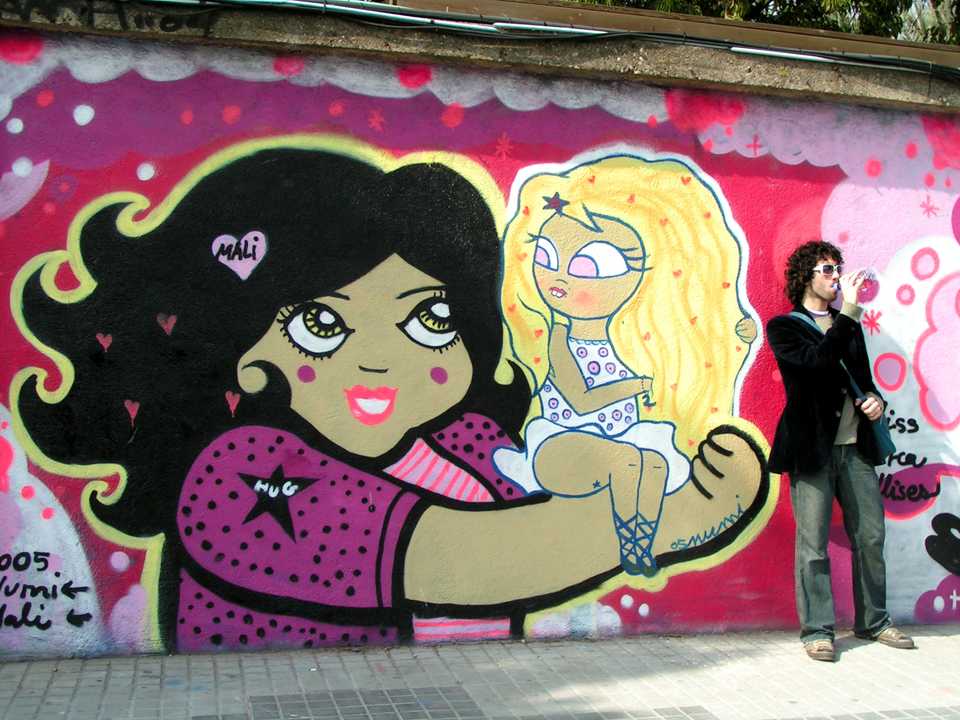
Barcelona, Spain, 2006
After graduating with a BaH from Brock in 2006, he still had the urge to travel and discover new places. So, when deciding where to pursue a Master of Communications, he chose Calgary, Alberta because “I wanted to go somewhere in Canada I knew nothing about. I had never visited Calgary before; I just knew that politically it was very different from Ontario and I knew there were mountains there.”
He has now made a home for himself in Calgary. His Masters is in progress; he started at the University of Calgary and is now completing it at the University of Alberta. But as rewarding as his post-post-secondary school education has been, he’s learned—and accomplished—a whole lot more outside the classroom walls.
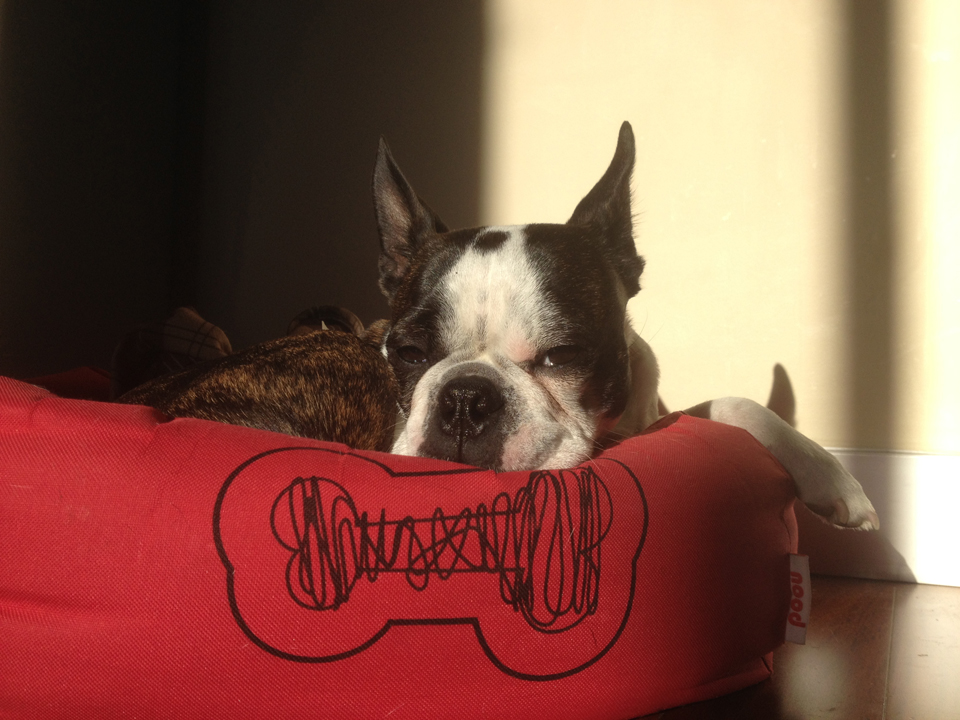
Ouzo, Yiorgos’ beloved Boston Terrier
While working as a youth program coordinator for the Calgary Catholic Immigration Society (CCIS) from 2008 to 2010, Yiorgos had the opportunity to serve as a youth advisor for both UNESCO and the Canadian Parks Council (CPC). “Through my job at CCIS, I was meeting with immigrant youth on a daily basis, leading workshops and helping them figure out what support systems they needed. So, I was in a good position to advise on the services they needed to make their lives here in Canada and feel like they’re part of Canadian society.”
With UNESCO, that involved exploring ways to engage and empower immigrant youth in communities around the world. With CPC, it hit a little closer to home. “In Canada, we’re really proud of our parks and the natural beauty of our habitat,” says Yiorgos. “A lot of immigrants in Calgary don’t feel they have access to that; they feel that only privileged people can go to the mountains on the weekends. Working with CPC, we looked at how we can let people know that it’s at their disposal, that it’s not just for a certain group of ‘Canadians.’”
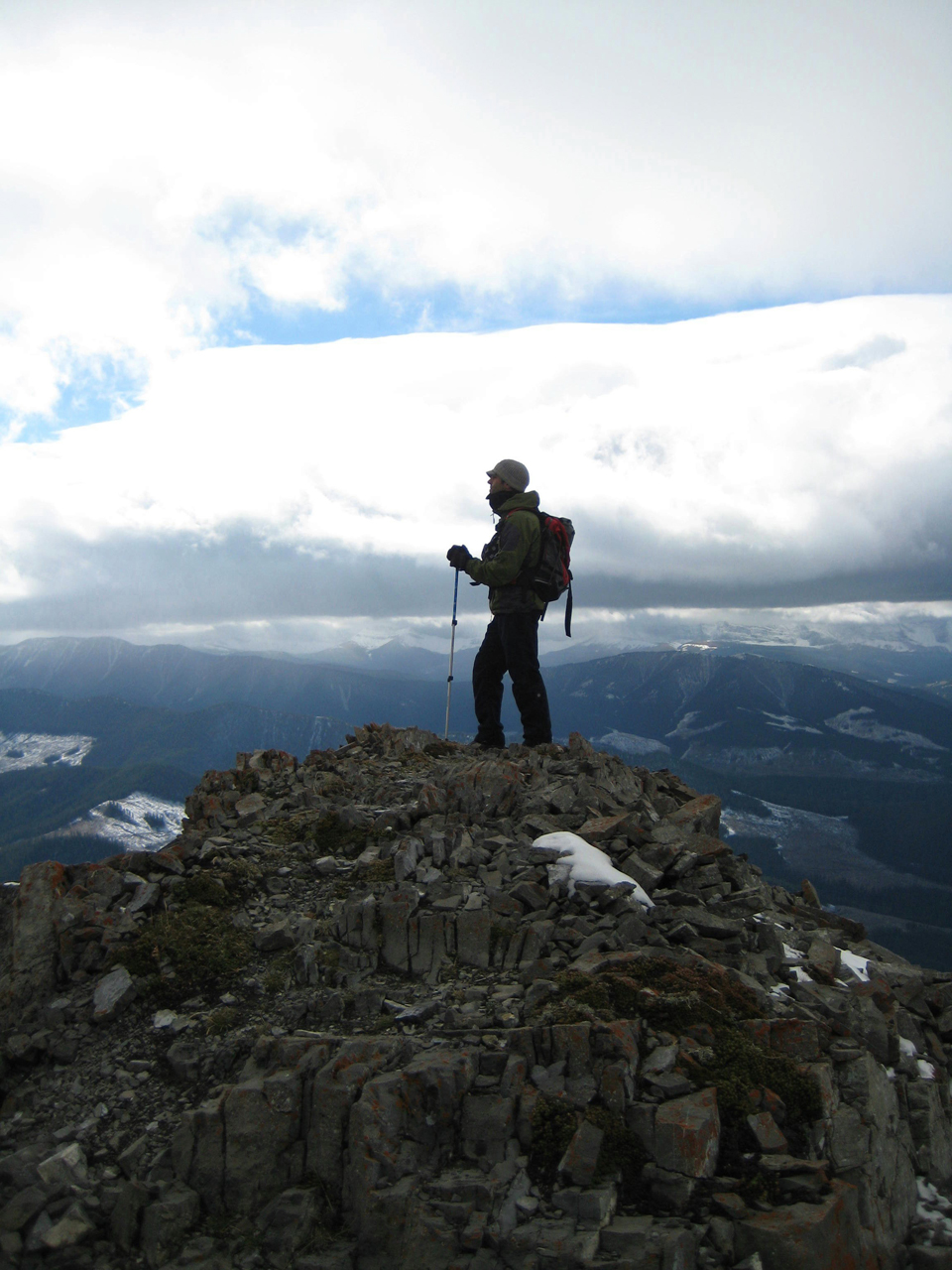
Mount Burke, in the Canadian Rockies, near Calgary, Alta.
In 2010, he took a job with the City of Calgary, where he’s currently Team Lead for Employee Learning, Development and Engagement. “The city’s been a really great place to work. I started around the same time Mayor Naheed Nenshi was elected and it’s been really interesting to see how having a mayor like him affects how we go about our work. There’s much more drive toward communications, citizen-focused services and overall accountability.”
He also recently became an advisory board member for Zaypo, an organization “dedicated to bringing women leaders together,” and a guest speaker for United Way of Calgary. With United Way, he visits local high schools to talk to students about his career and the importance of education. “What I hope to do is help students see why there’s value in continuing with their education. No one in my family had post-secondary education, so I didn’t grow up in an environment where I knew what it was like to attend university. When I meet with these students, I tell them why formal education is important, but also about all the other stuff you can get along the way, like travel. Staying in school doesn’t mean you’re restricted, and you can make a lot of great choices while attending post-secondary school. And certainly as a result of it, your social mobility is significantly greater.”
Throughout all this, Yiorgos finds time to keep up with his athletic pursuits. He opted out of serious swimming competition while at university because of the demanding training schedule, but he still gets his kicks as a Masters swimmer, and as a runner (half- and full marathons) and triathlete. He has completed more than 15 triathlons, including the Half Ironman at the inaugural Ironman 70.3 Calgary in 2009.
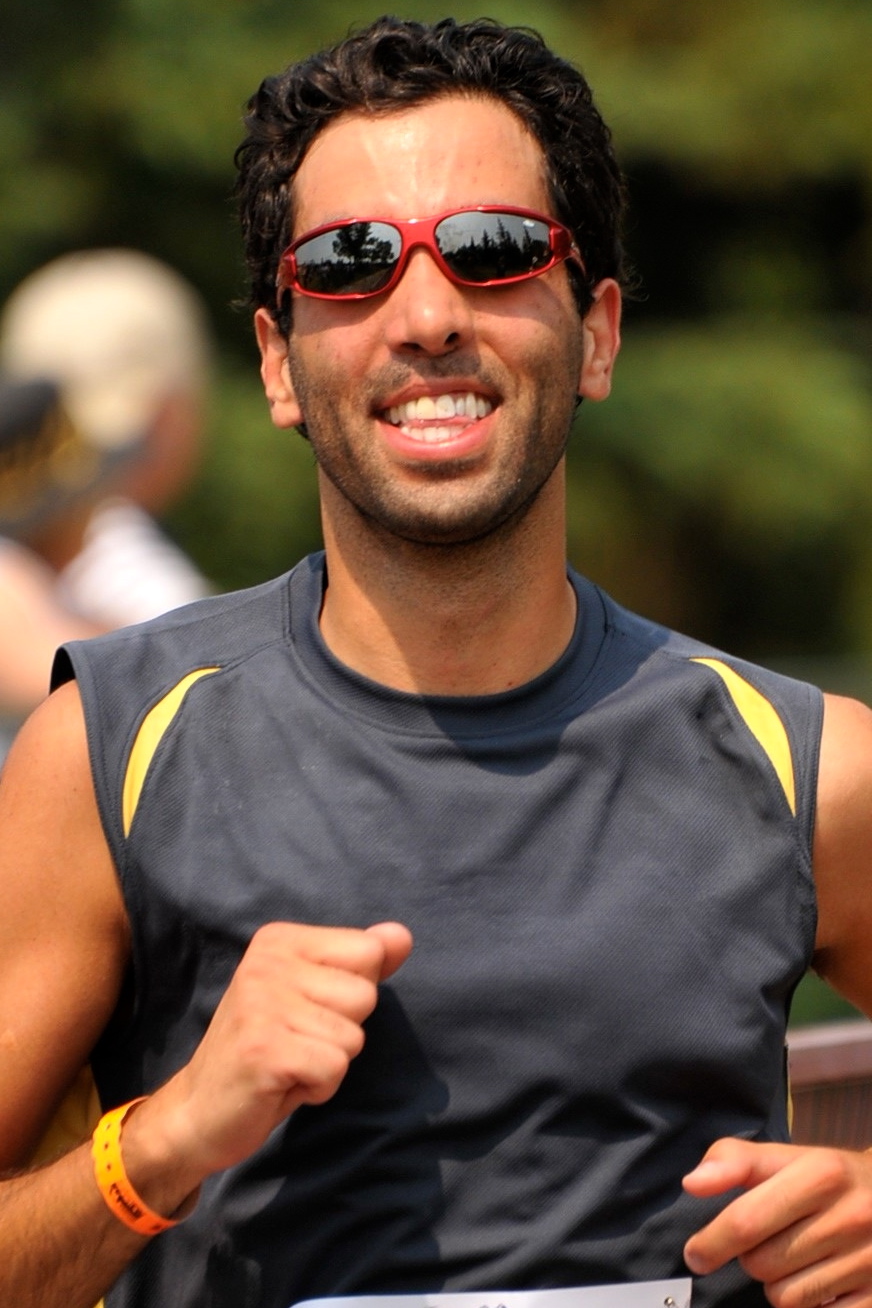
At the end of one of his triathlons
Acts of Greatness
And then, of course, there is Yiorgos’ own organization. Acts of Greatness officially launched in January 2014, and the call for applications for its first award opened this March (it remains open until May 30, 2014). EducationMatters is handling the application process, and Yiorgos’ partner, Jeff, helped with the website development. But otherwise, Yiorgos is running the show by himself—including covering all operational costs and the inaugural $500 award.
“I’ve had it really good and I appreciate that some other people aren’t in that situation. Right now, I’m financially stable, I have spending cash, so why not put the money here? I don’t ever expect or really want to make money off Acts of Greatness; what I’m really hoping to do is spend my money in order to get people’s attention and to get people to want to contribute funds for future awards.”
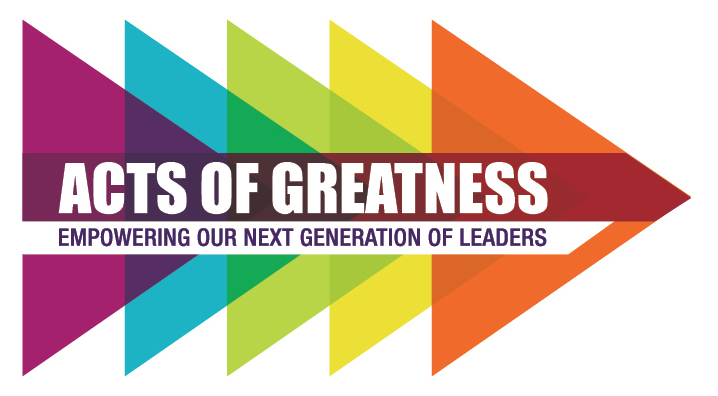
Yiorgos is already looking far down the road ahead. In 2015, he hopes to offer awards in Edmonton as well as Calgary, and by 2016, he hopes to extend across Canada. “I can’t wait to see what types of applicants we get and to read about all the amazing work youth are involved in.”
So how does the award work? Eligible applicants include any student in their final year at a Calgary secondary school who plans to enroll in post-secondary education and who is a member of the LGBTQ community. That includes LGBTQ students as well as their allies.
“You don’t have to be gay to get the award,” says Yiorgos. “I’m looking for people who are helping support the lives of these individuals, regardless of their sexuality or orientation or how they identify in terms of gender.”
He’s also keeping an open mind about the award’s selection criteria. Applicants don’t need to have perfect transcripts. As he sees it, “if you’re someone who is experiencing some kind of persecution as a result of how you identify, then good luck to you trying to be a 90% student in that hateful environment.” And which post-secondary institution applicants are headed for is up to them; universities and colleges, as well as technical and creative programs, are all fair game.
Regardless of their academic (or other) inclinations, the award winner will have $500 paid directly to the post-secondary school they choose after they’ve enrolled. Because what matters most to Yiorgos is that he’s able to reward leadership and encourage youth to pursue higher education.
“The goal is to recognize people who have shown leadership in the LGBTQ community, and that can look like a lot of different things,” he says. “It could be someone who starts up their own event in their high school, or has logged lots of hours with a local LGBTQ organization in Calgary. Or maybe they’ve done work with organizations that help fellow community members across the world… Sometimes leadership is just showing up and being yourself; if you’re being yourself in an environment that doesn’t support who you are, that’s an act of greatness, as far as I’m concerned.”
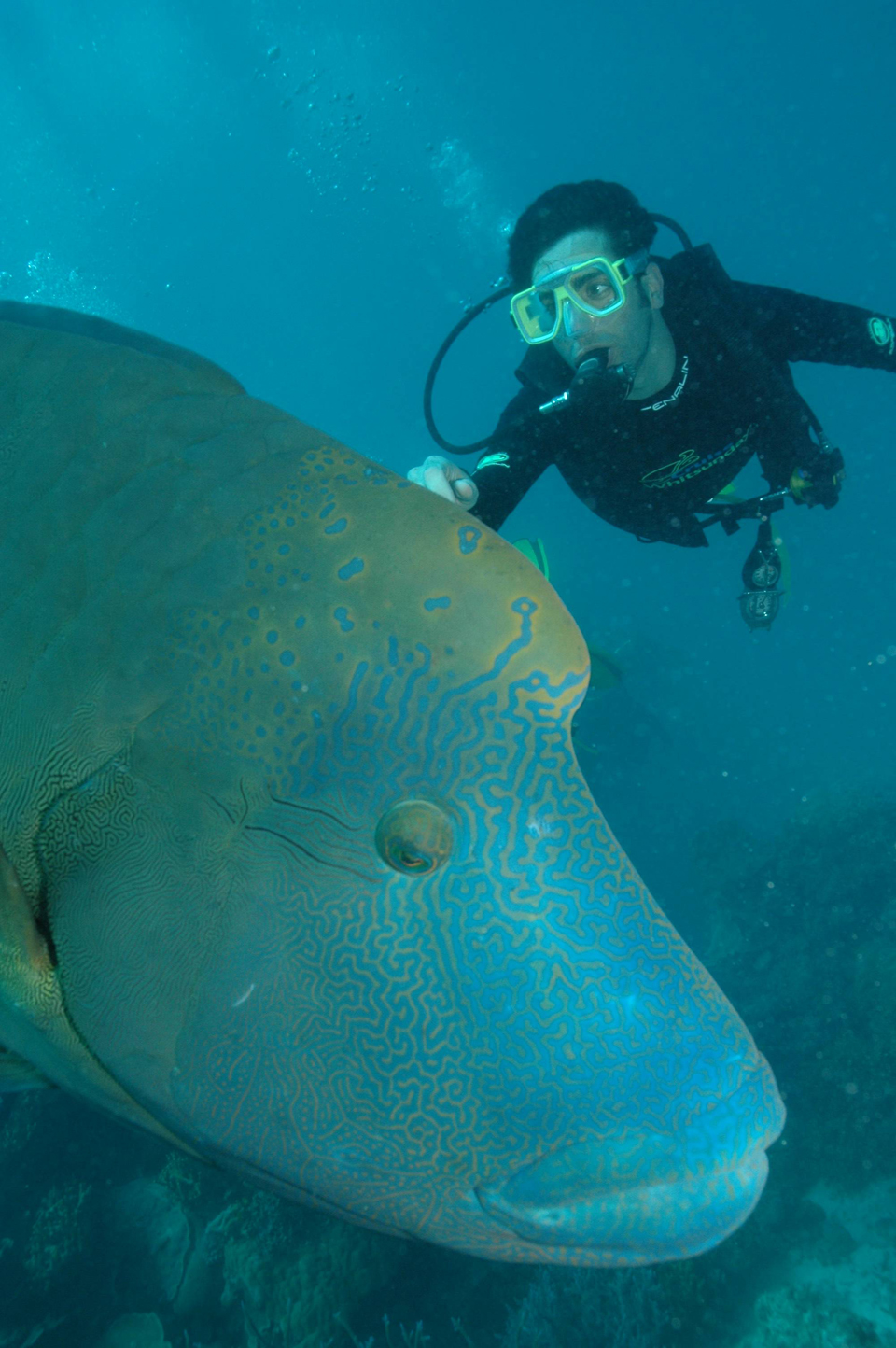
Scuba diving on the Great Barrier Reef, Australia, 2008
Taking responsibility
Yiorgos is an excellent authority on acts of greatness, having committed so many himself. In awe of his generosity, courage and initiative, I ask what makes him so passionate about providing a platform for people who are underrepresented or marginalized—youth, women and immigrants, as well as members of the LGBTQ community.
“I guess because I am one of these people,” he says. “I’m fortunate to have a voice and to be very confident in my voice, and to have resources that have enabled me to make a positive impact where I can. But I’ve met lots of people who don’t feel that way and don’t have that confidence in themselves, and don’t have a secure environment to allow them this privileged place of being yourself—which I think is a privilege, still to this day. So that’s why; I see it as my responsibility.”
With the first award to be presented this August, Yiorgos is looking forward to great things from his organization. He hopes to secure sustainable funding to keep the awards running for “as long as they’re needed.” Eventually, he’d like to incorporate a mentorship component to Acts of Greatness, whereby applicants could be matched with their LGBTQ peers who are already at post-secondary school or in the workforce.
“I think Acts of Greatness has the capacity to really be something special. Now it’s up to me to keep up the pace. We’re always so concerned with what we’re leaving behind, but I could care less if I had a really nice house to leave behind, or if I had all this success to talk about in my job. What’s more important to me is that I can leave something that will help others. So that’s really kind of my driving force right now: ‘Can I be successful in my career so that I have funds and I might be in a position of power to help others.’ That’s number one.”
* * *
To contact Yiorgos, email [email protected] or join him on LinkedIn. To learn more about his organization, visit actsofgreatness.org and follow @ActsofGreatness on Twitter.
 Kickass Canadians
Kickass Canadians
Exciting news to share – thanks to a generous donor, we’ve already established enough funds for another award in 2015! Thank you to all of you’ve taken the time to support Acts of Greatness. You have my sincere thanks.
Awesome news, Yiorgos!! Congratulations. 🙂